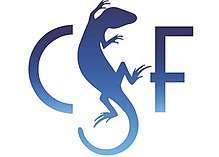Conservation Strategy Fund
Conservation Strategy Fund (CSF) is an international non-governmental environmental conservation organization based in Washington, DC, with offices in Arcata, CA, La Paz, Bolivia, Rio de Janeiro, Brazil, Lima, Peru, and Jakarta, Indonesia and additional staff in Colombia, Chile, and Sebastopol, CA.

It focuses on economic issues underlying the conservation of rainforests, oceans, and other ecosystems. CSF has focused on the world's tropical rain belt in Latin America, Africa, and Asia due to high amounts of biodiversity in those areas. Founded in 1998 by John Reid (conservationist), CSF has grown to over 30 employees in six offices around the world.
Projects
Conservation Strategy Fund helps local conservationists use economic tools to find smart, efficient solutions to the most urgent environmental problems. Since its creation in 1998, CSF has conducted dozens of analysis projects in forests, rivers and coastal environments. Most of their work has focused in the tropics, where extraordinarily high levels of biological diversity are found. To maximize the reach and quality of work, they involve leading experts and conservation organizations in all of their projects. Project partners have ranged from local activists and indigenous tribes, to big international NGOs and development banks.
Training
Since 1999, they have trained over 1800 people from over 85 countries.
CSF conducts training courses in South America, Palau, Uganda, Pohnpei, Democratic Republic of Congo, the United States and elsewhere, including their flagship course "Economic Tools for Conservation" held annually at Stanford University in Palo Alto, CA. These courses educate conservationists in economic fundamentals and practices, so that they can persuasively and accurately present information.[1] Its training courses encompass the basics of economics, cost-benefit analysis, net present value, and various other tools in order to help its alumni present real numbers to strengthen parks and protected areas, influence policies, craft sustainable development paths and avert damage from major infrastructure projects such as roads and dams.[2] Among other issues, CSF is concerned with endangered species, pollution and climate change.
Achievements
Today CSF is the leading organization advancing conservation solutions powered by economics. CSF analysts have proven the value of protected areas, shown how to build infrastructure at lower cost and with less damage, and nurtured local sustainable businesses. Over $20 billion in development investments have been impacted, resulting in improved conservation of over 20 million acres. CSF's programs have reached over 1,800 professionals in over 650 organizations, based in 85+ countries. Trainings now include custom courses for marine ecosystems, climate change, protected areas, enterprise and infrastructure, among other themes. Formats are now specially tailored for emerging economists, government officials and conservation leaders, as well as general conservation audiences. All this has helped bring about a sea of change in conservation: wide acceptance of the strategic importance of economics for success.
Some notable achievements include helping to establish 1.5 million acres of protected area in central Brazil, helping local people divert the construction of a road through Volcán Barú National Park in Panama, successfully preventing construction of a dam that would have flooded significant portions of Madidi National Park in Bolivia, and delaying the paving of highway BR-319 in the Brazilian Amazon which, without proper safeguards, could have inflicted harm on the world's largest rainforest.[3]
In 2012, the John D. and Catherine T. MacArthur Foundation named Conservation Strategy Fund as a recipient of the MacArthur Award for Creative and Effective Institutions. The award recognized CSF’s innovative work using economics to conserve the world’s most important ecosystems.
Conservation Strategy Fund is one of only 15 organizations from six countries to be recognized today with the MacArthur Award for Creative and Effective Institutions. The MacArthur Foundation does not seek or accept nominations for these awards. To qualify, organizations must demonstrate exceptional creativity and effectiveness; have reached a critical or strategic point in their development; show strong leadership and stable financial management; have previously received MacArthur support; and engage in work central to one of MacArthur’s core programs.
References
- CSF Website="About Us"> http://live.csf.gotpantheon.com/en%5B%5D
- Our Future Planet="Conserving Nature with Economics - The Conservation Strategy Fund"> http://www.ourfutureplanet.org/news/466 Archived 2011-09-25 at the Wayback Machine
- Our Future Planet="Conserving Nature with Economics - The Conservation Strategy Fund"> http://www.ourfutureplanet.org/news/466 Archived 2011-09-25 at the Wayback Machine